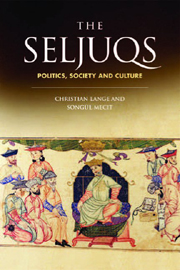Book contents
- Frontmatter
- Contents
- List of figures
- Acknowledgements
- List of abbreviations
- INTRODUCTION
- PART I POLITICS
- PART II SOCIETY
- 6 ARSLĀN ARGHŪN – NOMADIC REVIVAL?
- 7 CONTROLLING AND DEVELOPING BAGHDAD: CALIPHS, SULTANS AND THE BALANCE OF POWER IN THE ABBASID CAPITAL (MID-5TH/11TH TO LATE 6TH/12TH CENTURIES)
- 8 THE SELJUQS AND THE PUBLIC SPHERE IN THE PERIOD OF SUNNI REVIVALISM: THE VIEW FROM BAGHDAD
- 9 CHANGES IN THE OFFICE OF ḤISBA UNDER THE SELJUQS
- 10 AN EMBLEMATIC FAMILY OF SELJUQ IRAN: THE KHUJANDĪS OF ISFAHAN
- Part III CULTURE
- Index
9 - CHANGES IN THE OFFICE OF ḤISBA UNDER THE SELJUQS
from PART II - SOCIETY
Published online by Cambridge University Press: 12 September 2012
- Frontmatter
- Contents
- List of figures
- Acknowledgements
- List of abbreviations
- INTRODUCTION
- PART I POLITICS
- PART II SOCIETY
- 6 ARSLĀN ARGHŪN – NOMADIC REVIVAL?
- 7 CONTROLLING AND DEVELOPING BAGHDAD: CALIPHS, SULTANS AND THE BALANCE OF POWER IN THE ABBASID CAPITAL (MID-5TH/11TH TO LATE 6TH/12TH CENTURIES)
- 8 THE SELJUQS AND THE PUBLIC SPHERE IN THE PERIOD OF SUNNI REVIVALISM: THE VIEW FROM BAGHDAD
- 9 CHANGES IN THE OFFICE OF ḤISBA UNDER THE SELJUQS
- 10 AN EMBLEMATIC FAMILY OF SELJUQ IRAN: THE KHUJANDĪS OF ISFAHAN
- Part III CULTURE
- Index
Summary
The market inspector (muḥtasib), as censor of morals and prosecutor of offences perpetrated in the bazaars and streets of the Muslim city, has been called the ‘guardian of the public space’ in medieval Islam. His primary sphere of influence, the market-place, was adjoined, on one side, by the Muslim city-dwellers' households, into which his authority could at times extend. On the other side, it bordered on the awe-inspiring citadel of the prince, conspicuous reminder of the ruler's dominion over the urban landscape; it was from here that the muḥtasib's power ultimately derived. The muḥtasib thus negotiated between the claims to the inviolability of Muslim households on the one hand, and the dictates of government on the other. Whoever defined the rights and duties of the muḥtasib had a share in drawing the line that separated the private from the public. As I suggest in this chapter, while the Seljuqs adopted and continued features of Abbasid, Buyid and Ghaznavid state organisation, the office of ḥisba underwent developments which gave it a new and distinctly Seljuq profile. The changes in ḥisba introduced under the Seljuqs reflect a new type of relationship between state and society, particularly with regard to the configuration of public and private space, in the territories under Seljuq control.
TWO PROTOTYPES OF MUḤTASIBS: THE SAINT AND THE SCATOLOGIST
Under the Umayyads and the early Abbasid caliphs, the market inspector (then called ṣāḥib, or ʿāmil al-sūq) was primarily responsible for checking the accuracy of scales and measures, and the quality of foodstuff sold in the market.
- Type
- Chapter
- Information
- The SeljuqsPolitics, Society and Culture, pp. 157 - 181Publisher: Edinburgh University PressPrint publication year: 2011



